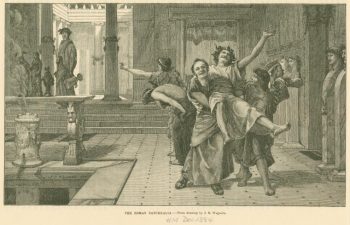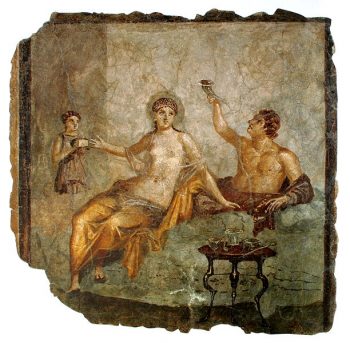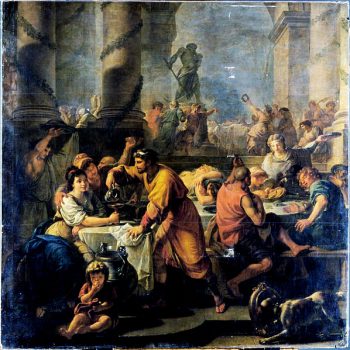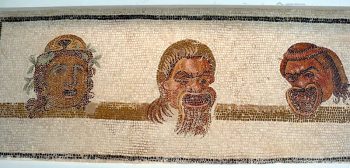6 Ways to Celebrate the Winter Solstice like an Ancient Roman Posted by Brittany Britanniae on Dec 21, 2016 in Roman culture
The week surrounding the longest night of the year, the Winter Solstice, marked the beginning of Winter for the Ancient Romans and so, like any other important time of the year, was brought in by revelry and extravagance. The is the week-long celebration of Saturnalia. Today, let’s look at some of the traditions that we may honor and replicate today in our own homes to remember and honor these ancient partiers.

Photogravure of a drawing depicting a drunken reveler being carried away by his friends during the Saturnalia. The setting appears to be the atrium of a Roman household. In the background, a figure holding an empty urn in one hand gazes on from atop some steps. 1884. John Reinhard Weguelin. Courtesy of Wikimedia Commons.
Today, for the northern hemisphere, is the Winter Solstice! If you’re learning Latin on here with us you might recognize the word “Solstice”. Derived from the latin words “Sol”, for sun, and “Sistere” (from “Stit-“), which means “stopped” or “stationary”, you can infer what the words means: The stopping of the sun.
This may seem counter-intuitive at first. The sun is barely making an appearance today, how could it be seen as “stopping”? Surely, the Summer Solstice makes much more sense with this name since the sun seems to stop in the sky. Well, the sun was thought to have been “stopping” for Winter Solstice, but it was stopping out of the sight of the Romans on the other side of the globe.
When it came to celebrating Saturnalia, a festival honoring Saturn, some of the traditions that the Romans had have carried down to today for our Christmas celebrations: feasting and gift-giving. But let’s look at some other ways the Ancient Romans observed this day and maybe think of ways to incorporate them into the family traditions of any Classics enthusiast!
-
Feasting the Roman Way

A late Roman-Republican banquet scene in a fresco from Herculaneum, Italy. 59 x 53 cm. The woman wears a transparent silk gown while the man to the left raises a rhyton drinking vessel. Courtesy of Wikimedia Commons.
One of the most pervasive traditions for any festival or holiday is the partaking of vast quantities of food and drink. The Romans would have gorged themselves on breads ad fruits as well as fish. Sauces were very important, made from vinegar, honey, pepper, herbs, and spices. They had a particularly popular sauce called Garum that was made of fish waste and salt water that had been left out for several weeks. If you are not feeling that adventurous to make your own Garum consider gathering some fancier breads, fruits, cheeses, some modern Italian sauces, and some sweet drinks. The Ancient Romans particularly liked sweet drinks such as the mixture of wine and honey. You might even dine the Roman way and lie on your side, lounging as you talk with your family or dinner guests.
-
Role Reversal

“Saturnalia”, featuring a feasting scene between slaves and masters, by Antoine Callet. Courtesy of Wikimedia Commons.
The Ancient Romans, on Saturnalia, had a very famous tradition of reversing the roles between masters and slaves. The slaves ate what the masters ate and the masters would even prepare the food for the slave and serve them. Slaves were also allowed a bit of freedom of speech – though, of course, they understood that the holiday would end and so they could not risk saying anything too rude. This is, thankfully, not something we can replicate exactly. However, on this day, if you and your partner have any particular roles in the household – they can be switched. This might be an interesting exercise for a relationship on its own. Children can serve the dinner (if not plan or prepare it), or can be invited to eat at the “grown-up table” and the grown-ups can huddle around the kids’ table. All you need to do is flip the norms of your household on their head in a humorous way, be creative!
-
Role-Playing: A Masquerade

Three comedy masks. Mid third century. House of Masks, Sousse Archeological Museum of Sousse. Courtesy of Ad Meskens and Wikimedia Commons.
On the same note as the previous point, the Ancient Romans also enjoyed some different kinds of role-playing that grew from the role-reversal tradition. There are even some hints, in the sources, that suggest the Romans engaged in mask-wearing or “guising”. This is a great chance to throw a modern masquerade party! Invite friends to come in a disguise and participate in the revelry of greeting to beginning of winter. Or, if you’d prefer a family occasion, make masks with the children as a fun activity. Or for a more private affair, enjoy the Saturnalia-infused spirit of the masked productions of Roman Comedy. Even though Saturnalia has little affiliation with the theatre, Erich Segal, the noted Classicist, reasoned: Roman Comedy featured casts of impudent, free-wheeling slaves and libertine seniors which seemed to imbue it with Saturnalia charm.
-
Gambling

This Roman terracotta dice is not the sum of opposite sides of seven! Museum at Delos A3985. Courtesy of Wikimedia Commons.
Ancient Romans, during this week, were allowed to ignore the laws that prohibited gambling in all forms that had restricted the sport for all people. Even slaves, during Saturnalia, were allowed to gamble. Ancient Romans would partake in dice games and would bet coins and nuts. If you’re adventurous you could take this cue to head to Vegas, or the local equivalent. For those who would prefer to stay insight on the longest and maybe the chilliest night of the year you can play dice games, like Yahtzee or Liar’s Dice, or card games with a partner, your family, or your friends and keep things low-stakes (and legal, in some areas) by betting nuts. This compliments the season pretty well as nuts are usually more popular and available around Christmas-time.
-
What to Wear?: Synthesis and Pileus
If you have the activities and the food situations taken care of now and want a way to dress for the occasion, consider what the Ancient Romans wore. The Ancient Romans also greeted this festival with changing up their garb. They traded in their famous toga for the Greek Synthesis. The great thing about these Classic looks is that you can replicate them pretty easily with bedsheets (if you aren’t afraid of being seen wearing bedsheets).

Samnium, Aesernia. Circa 263-240 BC.
Æ 20mm (6.90 g).
VOLCANOM head of Vulcan wearing pileus left; tongs behind
AISΕRΝΙΝΟ Iupiter driving biga right; Nike flying above.
Near VF, green patina. Courtesy of WIkimedia Commons.Also consider the special, Greek hat the Ancient Romans also wore: the Pileus. This was a felt, rimless cap that stood up to a point. This cap was often worn by liberated slaves and was meant to signify freedom from bondage. This type of cap is even popular today in Albania and Kosovo!
-
(Bad) Greeting Card Poetry

Gaius Valerius Catullus (ca. 84 BC – ca. 54 BC) was one of the most influential Roman poets of the 1st century BC. His work is still widely studied, and his perennial influence continues to be seen in poetry and other forms of art. Courtesy of Wikimedia Commons.
One last activity to consider is the writing of poetry. The Ancient Romans would often send gifts during this time and attached to them were poems that were something like what we would call greeting cards, today. One Romance, Callatus, received a book of bad poetry from a friend who joked that the poetry was written by the “worst poet in the world”. So, today, you might write out poems on your holiday gifts or you can make it a game if you enjoy literary fun. In particular you could make a game of writing bad poetry – the worst poem wins!
For Classics and Latin enthusiasts the historical traditions of the Ancient Romans have always fascinated us. For anyone who enjoys historically significant activities and traditions or wishes to impart these ancient activities to the new generation in their household on a night that is not as widely recognized as it used to be; these and other Saturnalia-inspired activities could prove to be the start of new (and ancient) traditions for a couple, a group of friends, or family that prizes and respects Classical History.
Have a wonderful (short) day and enjoy the longest night of the year by remembering the ancients!

Build vocabulary, practice pronunciation, and more with Transparent Language Online. Available anytime, anywhere, on any device.
About the Author: Brittany Britanniae
Hello There! Please feel free to ask me anything about Latin Grammar, Syntax, or the Ancient World.



